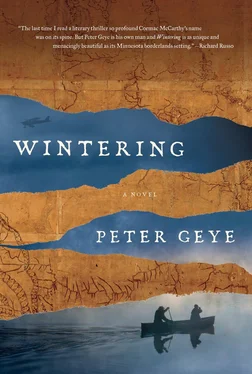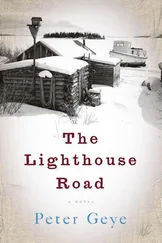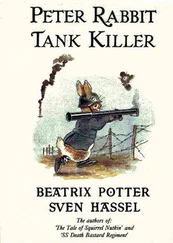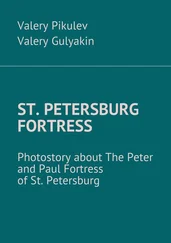“Last year it snowed on Tom’s birthday in May,” Gus said.
“I watched it snow in June one year. The lilacs took a real dusting.”
“Well, there’ll be no snow today,” he said.
“Certainly not,” said his wife.
We veered right at the stoplight and drove toward the Lighthouse Road. When the apothecary came into view three blocks away, Gus craned his neck and said, “What’s that?”
Sarah was looking at Gus. So was Signe. But I was watching the expression on Sarah’s face as Gus drove. Something about her eyes reminded me of the fresh green of the grass on the roadside. We parked in back and Gus jumped out of his Subaru and started around to the front. By the time we caught up with him he was standing by the boat, one hand under his arm, the other on his chin. Sarah stepped beside him and put her arm around his waist. Signe moved to one side of them, as I did to the other. He glanced quickly in both directions, pausing once on each of us.
“Well?” Sarah said.
The boat had been my idea. For some thirty years it sat in the carriage house behind the apothecary, forgotten for so long. A more dilapidated thing you’ve never seen, but there was plenty still true about it. The keel, for instance. And the lapstrake planking. When Signe donated the apothecary and we took our first inventory — Bonnie and Lenora and I — we were surprised to discover it in the carriage house, covered with canvas on a trailer with four flat tires, a home for mice and chipmunks. But it also had an air of latent perfection, of incorruptibility, and we all agreed it would make a perfect showpiece. I asked Chuck Veilleux if he would restore it. He couldn’t, but knew who could. So, one day last November, he pulled it out of the carriage house and hauled it down to a place in Duluth. Sargent’s Boatwright and Chandlery, it was called. They spent the winter rehabbing the boat, not to make it seaworthy again but so it could sit out front of the Gunflint Historical Society with dignity.
Gus stepped over the hawser that had been strung around it and walked up its starboard side, his hand on the newly lacquered hull, the three of us behind him like schoolchildren trailing their pied piper. But at the stern he stopped and covered his eyes. The boat had once been named Rebekah, but I’d asked the men in Duluth to give her a new name, specifically the name of the man who’d built it: Odd Einar was now painted on the escutcheon.
“I thought it was gone,” Gus said. In the sunlight we could see his eyes get glassy.
“Nope,” Sarah said. “Berit kept it safe all these years.”
“No, Rebekah did,” I said.
Signe stepped over the rope and stood beside her brother. “Rebekah bought the boat the year you and Dad went wintering. He thought it was sold to some fisherman in Sault Ste. Marie. It’s been stored here in the carriage house all these years. It seems everyone forgot about it.”
“I never did,” Gus said. “I dreamed about it a million times.”
“Well, now you have it again,” Sarah said. “We all do.”
—
Four sets of bleachers had been erected on the Lighthouse Road in the shape of a horseshoe surrounding the Odd Einar. A podium and microphone had been set up in the bow. Bunting was hanging from the apothecary’s windows. The high school marching band stood off to the side, ready to play. At one o’clock folks started turning out, pretty much the whole town. The bleachers started filling up, and so did the lawn all around.
At one-thirty Mayor Bear Anderson stepped aboard the Odd Einar, welcomed the townsfolk, thanked the members of the historical society — singling out Lenora and Bonnie and me — and then reminded everyone that after the ribbon cutting there would be a pemmican feast sponsored by Sons of Norway and Immanuel Lutheran. It didn’t take him more than thirty seconds to get to introducing Gus. “We’re lucky up here, having such outstanding citizens. I bet if I asked any one of you about this next gentleman, the first thing you’d say is ‘I know Gus. He’s a friend of mine.’ That’s what I think of him, that’s for sure. This boat I’m standing on now was his granddad’s. And his great-grandma came walking down the Lighthouse Road about a hundred years ago. That’s how long the Eides have been here. I can’t think of anybody better to say a few words about this here historical society, the renewed heart of our beautiful town. So, without further ado, here’s Gus Eide.” He laid out a welcoming hand. “Gus, come on up here.”
He climbed the makeshift steps and shook Bear’s hand and pulled his speech from his coat pocket, laid it on the podium, then buttoned his coat and pushed his windblown hair out of his eyes. Smiling weakly, he looked at Sarah and Signe and then at me. When he put his mouth up to the microphone, it screeched, and he stepped back and smiled and then adjusted it and began.
“Thanks, Bear.” He nodded at the mayor, still right behind him. “You’ve done a lot for this town, a lot for all of us, and I think I speak for everyone when I say we appreciate it.” Everyone clapped. “See?” he said, and turned again to look at Bear, who waved like a grand marshal.
“And you’re right about us being friends. Friends and family. We’re lucky indeed.” He took his reading glasses from his chest pocket and squinted down his nose at his sheet of paper. He took one deep breath and then another and then took off his glasses and slipped them back in his pocket.
“Maybe I’d do better to wing this.” He swept his hair back again and began in earnest. “Without these three women down here, none of us would be standing here to celebrate the opening of a society dedicated to who we are. Bonnie Hanrahan, Lenora Lemay, and Berit Lovig, you’ve accomplished something really wonderful.” He gestured back at the apothecary. “Almost from the time folks started settling here, this building has been the center of Gunflint’s life. Your hard work ensures that it will continue to be. Every one of us thanks you deeply.”
He paused to collect his thoughts. “Miss Lovig tells me the walls of this place went up in the summer of 1893. Ever since then we’ve all called it the apothecary, even though not a single aspirin’s been sold here in about seventy-five years. I suggest that from this day forward we say it’s what that shingle up there says it is: the Gunflint Historical Society. Can we agree on that?” Again the crowd clapped.
“I’ve seen the exhibits inside and can tell you there’s something for everyone. We’ve got a rich and colorful past. And a complicated one. But I think it’s important we hold our past near to us. That we learn from it and keep living by it. In fact, I think we’re nothing without it.” He stared up at the pinnacle. “This building will help us keep our past to heart. It will help us keep it alive.” He nodded his head, satisfied.
“So, Miss Lovig, and Bear, why don’t you join me at the front door so we can cut this damn ribbon.”
—
At four o’clock we locked the doors. Bonnie and Lenora were behind the counter counting up the donations — a fair number had been made — and Sarah stood at the window. Gus, who’d been quiet, almost taciturn, all afternoon, was beside her, staring across the room at the portrait of Rebekah Grimm.
All the townsfolk had come through the exhibit, and by any measure the grand opening had been a success. I was relieved, as Signe was. It seemed an odd time for Gus to seem so melancholy, so I walked over to him.
“You look glum, Gus.”
“I’m not,” he said. “I was just looking at my grandmother over there. She’s still keeping an eye on us, eh?”
“I suppose she is.”
“Do you remember the first morning I came to visit you? After my father disappeared?”
Читать дальше












